Notes
- ↑ John Miller, Early Modern Britain 1450–1750 (Cambridge: Cambridge University Press, 2017), p. iv.
- ↑ 'EVENTS TO MARK THE RETIREMENT OF PROFESSOR JOHN MILLER', Queen Mary University of London website. Retrieved 2 November 2022.
John Miller (born 5 July 1946) is a British historian of the seventeenth century, with particular focus on the reigns of Charles II and James II and the Glorious Revolution. [1] He was a professor at Queen Mary University of London. [2]

The Glorious Revolution is the sequence of events that led to the deposition of James II and VII in November 1688. He was replaced by his daughter Mary II and her Dutch husband, William III of Orange, who was also his nephew. The two ruled as joint monarchs of England, Scotland, and Ireland until Mary's death in 1694. The Revolution itself was relatively bloodless, but pro-Stuart revolts between 1689 and 1746 caused significant casualties, while the political movement known as Jacobitism persisted into the late 18th century. William's invasion was the last successful invasion of England.

Jacobitism was a political movement that supported the restoration of the senior line of the House of Stuart to the British throne. The name derives from the first name of James II of England, which is rendered in Latin as Jacobus. When James went into exile after the November 1688 Glorious Revolution, the Parliament of England decided that he had abandoned the English throne, which they offered to his Protestant daughter Mary II of England, and her husband William III. In April, the Scottish Convention held that James "forfeited" the throne of Scotland by his actions, listed in the Articles of Grievances.

Charles II was King of Scotland from 1649 until 1651 and King of England, Scotland, and Ireland from the 1660 Restoration of the monarchy until his death in 1685.

The Restoration of the Stuart monarchy in the kingdoms of England, Scotland, and Ireland took place in 1660 when King Charles II returned from exile in continental Europe. The preceding period of the Protectorate and the civil wars came to be known as the Interregnum (1649–1660).
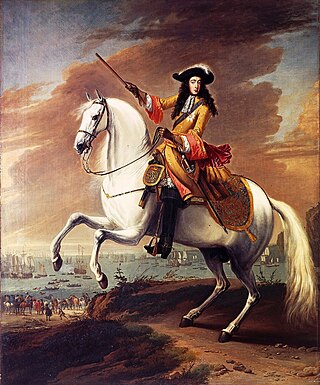
The English Revolution is a term that describes two separate events in English history. Prior to the 20th century, it was generally applied to the 1688 Glorious Revolution, when James II was deposed and a constitutional monarchy established under William III and Mary II.
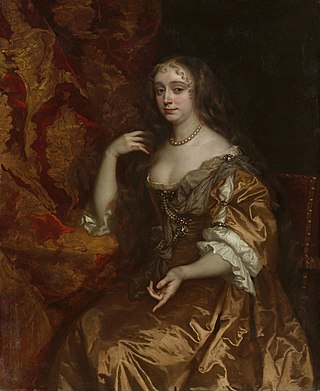
Anne Hyde was the first wife of James, Duke of York, who later became King James II and VII.

The Kingdom of England was a sovereign state on the island of Great Britain from the early 10th century, when it emerged from various Anglo-Saxon kingdoms, until 1 May 1707, when it united with Scotland to form the Kingdom of Great Britain, which would later become the United Kingdom. The Kingdom of England was among the most powerful states in Europe during the medieval and early modern colonial periods.
The Declaration of Indulgence, also called Declaration for Liberty of Conscience, was a pair of proclamations made by James II of England and Ireland and VII of Scotland in 1687. The Indulgence was first issued for Scotland on 12 February and then for England on 4 April 1687. An early step towards establishing freedom of religion in Great Britain and Ireland, it was cut short by the Glorious Revolution.
Early modern Britain is the history of the island of Great Britain roughly corresponding to the 16th, 17th and 18th centuries. Major historical events in early modern British history include numerous wars, especially with France, along with the English Renaissance, the English Reformation and Scottish Reformation, the English Civil War, the Restoration of Charles II, the Glorious Revolution, the Treaty of Union, the Scottish Enlightenment and the formation and the collapse of the First British Empire.
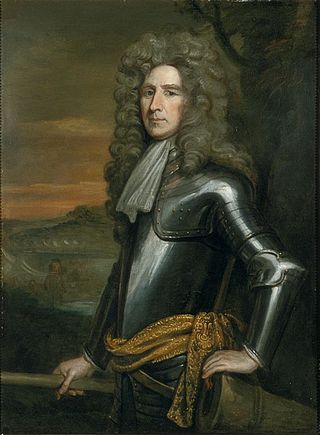
Henry Sydney, 1st Earl of Romney was an English Army officer, Whig politician and peer who served as Master-General of the Ordnance from 1693 to 1702. He is best known as one of the Immortal Seven, a group of seven Englishmen who drafted an invitation to William of Orange, which led to the November 1688 Glorious Revolution and subsequent deposition of James II of England.
Jonathan Charles Douglas Clark is a British historian of both British and American history. He received his undergraduate degree at Downing College, Cambridge. Having previously held posts at Peterhouse, Cambridge and All Souls College, Oxford into 1996, he has since held the Joyce C. and Elizabeth Ann Hall Distinguished Professorship of British History at the University of Kansas.
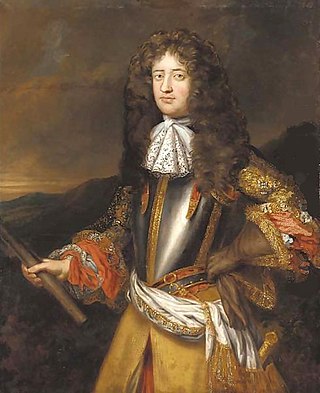
Major-General George Douglas, 1st Earl of Dumbarton KT was a Scottish military officer who spent much of his career in the service of King Louis XIV. In 1678, he returned to England; as a Catholic, he was a trusted servant of King James II and went into exile with him after the 1688 Glorious Revolution. He died at the palace of St Germain-en-Laye in March, 1692.

James VII and II was King of England and Ireland as James II and King of Scotland as James VII from the death of his elder brother, Charles II, on 6 February 1685. He was deposed in the Glorious Revolution of 1688. He was the last Catholic monarch of England, Scotland, and Ireland. His reign is now remembered primarily for conflicts over religious tolerance, but it also involved struggles over the principles of absolutism and the divine right of kings. His deposition ended a century of political and civil strife in England by confirming the primacy of the English Parliament over the Crown.
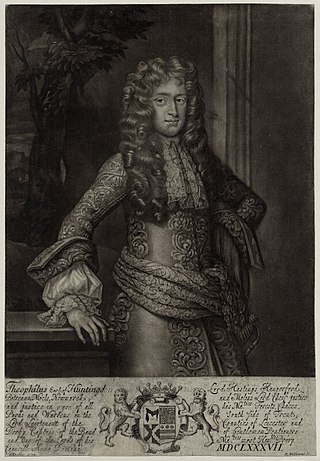
Theophilus Hastings, 7th Earl of Huntingdon was a 17th-century English politician and Jacobite. One of the few non-Catholics to remain loyal to James II of England after November 1688, on the rare occasions he is mentioned by historians, he is described as a 'facile instrument of the Stuarts,' a 'turncoat' or 'outright renegade.'

Robert Brady (1627–1700) was an English academic and historical writer supporting the royalist position in the reigns of Charles II of England and James II of England. He was also a physician.

The Stuart period of British history lasted from 1603 to 1714 during the dynasty of the House of Stuart. The period ended with the death of Queen Anne and the accession of King George I from the German House of Hanover.

The Loyal Parliament was the only Parliament of England of King James II, in theory continuing from May 1685 to July 1687, but in practice sitting during 1685 only. It gained its name because at the outset most of its members were loyal to the new king. The Whigs, who had previously resisted James's inheriting the throne, were outnumbered both in the Commons and in the Lords.
Timothy J. G. Harris is an historian of Later Stuart Britain.
James Rees Jones was a historian of seventeenth century England. He was a lecturer in history at King's College, Newcastle from 1952 to 1963 and at the University of East Anglia from 1963 to 1966. He was appointed Professor of History at East Anglia in 1966.